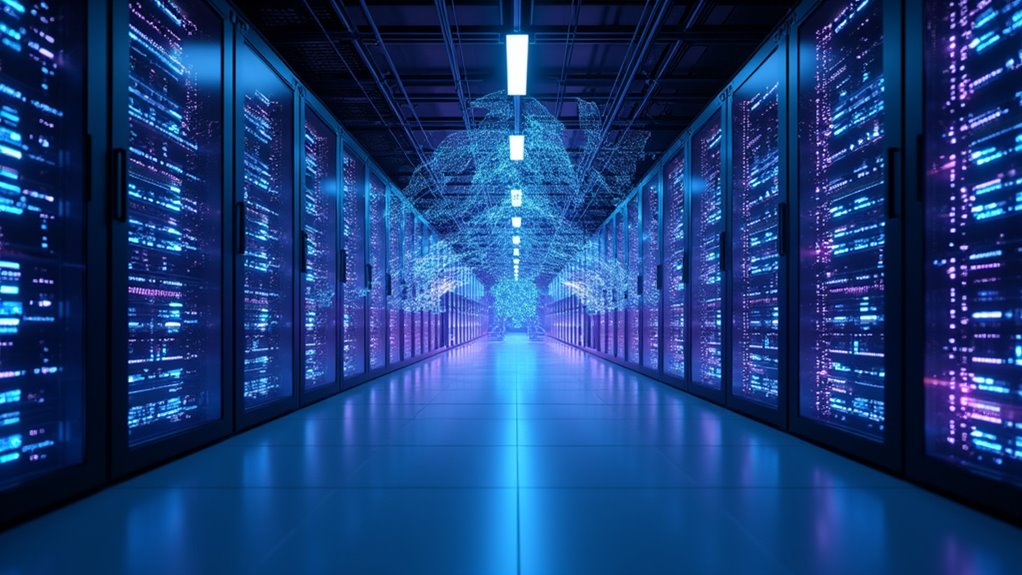Postgraduate AI and machine learning programs offer career-defining opportunities with substantial salary potential. Top institutions like IIT Kanpur and Johns Hopkins blend theoretical concepts with hands-on projects, allowing specialization in sectors from healthcare to finance. Programs typically include core modules, electives, and real-world challenges. Yes, they’re expensive—but many employers contribute to tuition costs, recognizing AI’s value. The continuously evolving field demands lifelong learning, but formal education builds your foundation. Discover how these programs can transform your professional trajectory.

Countless professionals are now rushing to upskill in artificial intelligence and machine learning—fields that have transformed from obscure technical specialties to career-defining competencies virtually overnight.
It’s no wonder why—AI Careers offer substantial salary increases and leadership opportunities in virtually every industry. Those who master these technologies don’t just land jobs; they shape how entire sectors operate. But technical prowess alone won’t cut it. Machine Learning Ethics has emerged as a vital component, ensuring AI systems serve humanity rather than amplify existing problems. Yes, algorithms need moral compasses too.
Today’s leading programs embrace interdisciplinary approaches, recognizing that AI doesn’t exist in a vacuum. Institutions like IIT Kanpur, Johns Hopkins, and Northwestern University offer extensive curricula covering everything from neural networks to natural language processing. Johns Hopkins specifically provides a program that balances theoretical concepts with practical knowledge for immediate application in solving real-world AI challenges.
These aren’t just theoretical exercises—students tackle real-world challenges through hands-on projects and industry case studies. The difference between reading about computer vision and actually building a functional system? Night and day. Creating a robust portfolio of projects has become essential for standing out in the increasingly competitive AI job market.
Program structures typically include both core and elective modules, allowing students to tailor their education to specific interests. Want to focus on healthcare applications? There’s a path for that. Financial technology? Covered. The flexibility creates specialists, not just generalists who know a little about everything but master nothing.
Financially, these programs represent significant investments with equally significant returns. IIT Kanpur’s eMasters program offers education loan options and partial fee waivers to make the investment more manageable. Western Governors University’s term-based pricing model offers cost control advantages, while many employers contribute to tuition costs—they understand the value of AI-literate talent.
Programs designed for working professionals allow for career advancement without career interruption. Graduates emerge equipped to tackle the most pressing technological challenges of our time.
The continuous evolution of AI demands lifelong learning, but formal education provides the foundation that makes ongoing adaptation possible. In an increasingly AI-driven world, these programs don’t just teach technology—they prepare leaders who will determine how these powerful tools shape our collective future.
Frequently Asked Questions
How Does AI Program Cost Compare to Traditional Master’s Degrees?
AI programs typically cost more than traditional master’s degrees. Northwestern’s MSAI program runs about $22,077 per quarter, totaling approximately $110,000 with living expenses—ouch!
Traditional programs vary widely in tuition comparison but generally come in lower. Both options offer financial aid possibilities through loans and scholarships, but don’t count on full coverage.
Can I Switch Careers to AI Without Technical Background?
Yes, career shift to AI is possible without a technical background.
Start with online courses in AI basics, then leverage your existing non-technical skills—communication, problem-solving, and industry knowledge are surprisingly valuable.
Roles like AI ethics consultant or product manager don’t require coding expertise. The key? Strategic skills development.
Build a portfolio of AI projects that showcase your abilities.
What Programming Languages Should I Know Before Applying?
For aspiring AI professionals, Python essentials should top the priority list. It’s ubiquitous in AI development and has the libraries that actually make things happen.
R programming follows as a solid second choice for statistical analysis and data visualization. Most postgraduate programs expect familiarity with at least Python before admission.
Don’t panic about mastering everything—understanding fundamentals in one language beats shallow knowledge of many. Start coding small projects now; applications wait for no one.
Are Remote Internships Available During the Program?
Yes, remote internships are abundantly available during the program.
Students can access diverse remote work opportunities in AI and machine learning, collaborating with industry experts from anywhere. These virtual positions offer substantial internship benefits including flexible scheduling, exposure to cutting-edge projects, and valuable networking—without geographical limitations.
Many organizations specifically seek remote interns for roles involving data analysis, NLP, and AI framework implementation.
Frankly, remote internships have become the norm, not the exception.
How Do Graduates Fare Against Computer Science Phds?
Masters graduates in AI/ML often compete effectively with Computer Science PhDs in industry roles.
While PhDs possess deeper research expertise, masters graduates typically offer practical skills comparison with faster entry to the workforce.
Career opportunities overlap considerably, though PhDs may have advantages for research-intensive positions.
Masters holders generally demonstrate strong applied knowledge that employers value immediately.
The gap narrows over time as work experience often outweighs academic credentials in many tech companies seeking implementation-focused professionals.








